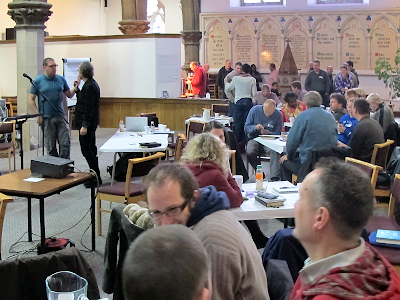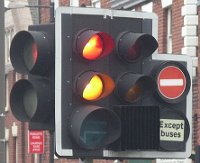Here are some of the main points made by Tony and Felicity Dale during their recent interview by Nomad. It's all good stuff; Tim and Dave head home with some highlights still buzzing in their minds.
Tim and Dave run the
Nomad Podcast. If you haven't heard any of their monthly interviews, you've been missing a treat!
The
latest interview is with Tony and Felicity Dale from Texas, recorded when they were in the UK recently. Tim and Dave travelled to Cheltenham to meet them for the interview. After five minutes of mirth and banter in the car they finally get to the point and the interview begins.
We hear the background story of the Dale's early days in medical school with patients coming to the Lord and many small, home-based communities. They moved to the USA in 1987, clearly led by the Spirit, but once they arrived they were at a loss for direction.
After nine years they gave Father an ultimatum, and things began to move again. They led a discussion with businessmen based on Proverbs and over the next year all of them became believers. They also started a breakfast Bible club for their children's friends. The children and then their families began to follow Jesus too. With the business people and the new families they decided to try to multiply the small rather than just growing bigger.
They learned that success in Father's eyes is not about what we do but much more about what we become because of Jesus. Even before they left the UK they learned not to build something that can survive with or without the Lord. But simple church is not a panacea for all ills, preconceived ideas can mean that house church just becomes big church shrunk smaller.
Felicity describes a simple church in an underprivileged area. It was messy and based very much on present needs, but that is what Jesus loves to do amongst his people. Life brings us into church as a lifestyle, not an event. We need to understand that we don't need experts, anyone can start a church. People gather in every context, the person of peace may be a Cornelius or a woman at the well. But regardless of the kind of person, such people have circles of influence and they have the ability to lead built into them.
Simplicity implies reproducibility, complexity slows down multiplication. We need to find simple patterns that the Lord can work through. Simple food is better than complex food, for example. Pot luck or pizza is just fine. The same applies for prayer for one another. Tony explains that they determined never to make things complicated or difficult. Prayer is just chatting naturally with Father.
The person of peace concept is missional, moving out into that person's context. Sequentialism is a barrier to multiplication - 'I need to do this before I start to do that'. Local community worked in the East End of London, but it doesn't work for the Dales in Austin. However, people are very mobile in the USA and they have community with visitors, at work, at the gym, or Starbucks. They are therefore living the presence of the Lord wherever they can.
We are called to make disciples, Jesus will build the church with those disciples any way he wishes. Tony explains how this happens in the business he runs, it's not a Christian company but discipling takes place there very naturally and easily.
Disciples need to learn the key skills of hearing from the Holy Spirit for themselves and being obedient.
After the interview, Tim and Dave discuss the session. Tim is particularly struck by the idea that making disciples is our call and Jesus will build the church. Dave is engaged by the thought that disciples are primarily people who hear and obey the Lord. There is some more amusing banter before the recording ends.
See also: Felicity's blog 'Simply Church' and the 'House2House' organisation they set up.






